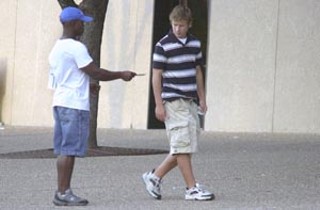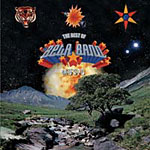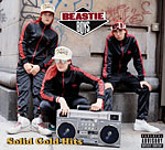Two Tickets to Paradise
That'll be $176, not including the service charge
By Matt Dentler, Fri., Aug. 27, 2004

Always ... be ... closing.
Like something out of Glengarry Glen Ross, the concert business doesn't get more cutthroat and competitive than when ticket sales are involved. Case in point: On a peaceful Saturday night in Austin, the Frank Erwin Center becomes a feeding frenzy as last-minute fans of classic rock dinosaurs Boston scurry to find ducats. Traders on the market floor, scalpers are quick to comply, fingers in the air and cardboard signs reading, "I Need Tickets." A $45 floor seat runs close to $70.
"These fans walk," says one scalper, speaking on the condition of anonymity.
Walk?
"They've been fans [of Boston] for 20 years, and now they have good jobs, but they wait until the last minute to buy tickets," he says.
At times, the scalpers outnumber the fans waiting to get in. It's tough to determine if the scalpers are going to have a good night, as the show is seemingly undersold. This particular scalper sells with a partner.
"He's the closer," explains the scalper.
They work the potential concertgoers hard, willing to cut a deal to move product. If a customer stalls at the $70 asking price, it soon drops to $50. At that price, the scalpers have actually gone below what a ticket would cost the official way. In other words, at moments like these, the Erwin Center's ticket agency – Texas Box Office – charges a higher service fee ($7-8) than the scalpers do.
Contradictions like these run rampant in the concert business. With a music industry in trouble, Austinites are finding themselves surrounded by more and more ticketing methods. What's the difference? It varies from day to day, show to show. Old ticketing conventions give way to new companies.
Meanwhile, a lackluster summer concert season across the country gives way to the upcoming Austin City Limits Music Festival, which will circulate more paper tickets than many months of local club shows combined.
Gate Crashing
"In the beginning, it was a leap of faith on their part, and I think it's a testament to how well it went since we're doing it again this year," says Mellie Price, head of Austin-based Front Gate Tickets, regarding her company's relationship with the ACL Music Festival.
For the second year in a row, the unofficial ambassador of Austin is this homegrown ticket agency. As thousands of music fans descend on Zilker Park, they'll pack their collapsible chairs and their factory-sealed bottles of water. Thanks to Front Gate, many of them will already have their tickets to the three-day music festival. If Front Gate does its job well, no one will notice it exists. Price has felt the pressure since day one of the partnership.
"When Front Gate got the ACL account, there was a lot of speculation for this new kid on the block," she claims. "We were basically told that we might as well be wearing cement shoes if it screws up. It's just not an option."
The underdog by default, Front Gate has come a long way in a very short period of time. In that process, it's impressed a lot of the industry and even signaled a sea change in the way tickets are sold. Not bad for an agency that didn't even get its start as a ticketing firm.
Front Gate Solutions linked up with Austin Web designer Price in 2002 to develop software she was designing. Front Gate Tickets was officially born in February 2003, but it was an uphill battle to break through in a town where another regional ticket agency, Star Tickets, had become the gold standard. One popular Austin venue, Stubb's, decided to roll the dice and take a chance on the newcomer.
"They agreed to be the flagship client," says Price from her office on West Sixth Street. "They were willing to break the mold of the one ticket agency in town."
What began as a gamble paid off admirably, as Front Gate Tickets has planted their Stubb's seed and harvested a roster of as many as 27 venues in 2003. Front Gate now services clubs in Dallas and Houston, including Trees, Gypsy Tea Room, and the Granada Theater. Stubb's remains Front Gate's primary client, along with Austin staples such as the Parish and the Continental Club. More importantly to the future of ticket sales, perhaps, as a company based in software and the Web, Front Gate's emphasis for ticket sales is placed on the company's Web site: www.frontgatetickets.com.
"We have outlets that help the cash-buying public, but we have not gone extensively into the outlet market," explains Price, referring to Austin outlets Jo's Coffee and Waterloo Records. "It's my opinion that by the year 2005, tickets [industrywide] will be sold online."
The ever-growing base of online consumers has made Front Gate's success partly due to being in the right place at the right time. Price cites the user-friendly Web site as a reason why the company has a great track record with its customers, both on the venue side and the ticket-buyer side.
"Our timing is well-suited with the shift in the market," declares Price. "More and more people are buying [products] online."
Due to a smaller market in its hometown, Front Gate has found greater success in areas like Dallas. Price is quick to point out that this makes sense, given that four major Austin concert destinations – the Backyard, Austin Music Hall, La Zona Rosa, and Antone's – all have their ticket services handled exclusively through Star Tickets Plus.
All four venues are operated by local concert-promotions company Direct Events. Because of this, Front Gate has an easier time selling tickets in similar venues in other cities. While Price isn't trying to get the Direct Events account from Star, she certainly feels it would be an advantageous relationship for all parties.
"I'd love to sell their tickets," she says, "and I know I could do a much better job for their customers and save their customers money and make [Direct Events] more money."
Unfortunately, the summer of 2004 has become a textbook example of too many shows and not enough customers – or money.
Tickets to Ride
As the summer concert season of 2004 began to unravel, national tours started to bite the dust. From Christina Aguilera to Marc Anthony, major acts pulled the plug on extensive tours after schedules and venues were already set. The biggest shock came when alternative touring festival Lollapalooza threw in the towel after tickets went on sale for two days' worth of bands on a cross-country trek.
"Lollapalooza was the victim of a lineup no one wanted to see," says Billboard senior touring writer Ray Waddell from his office in Nashville.
Waddell speaks candidly about the Lollapalooza cancellation, because after 18 years as one of the nation's foremost authorities on the touring industry, he knows what he's talking about. The cancellation of Lollapalooza was a major setback to the tour business in general, especially because ticket prices were not exceptionally high. The tour lacked a headliner, many argue. Nevertheless, Waddell claims it hasn't been an entirely disastrous summer for everyone on the road. "It's been a survival-of-the-fittest summer," he says.
Waddell cites outings by Madonna, Prince, and the Warped Tour as examples of summer concert tour triumphs. Otherwise, it's been a case of too many tours in too small of a window, because overall, "the concert business is the healthiest part of the music industry," states Waddell. He points to the ascent of online piracy and the descent in album sales as reason enough for acts to spend a greater portion of their time on the road. This, unfortunately, has saturated the market.
While there are more people than ever paying to see shows right now, there are also more shows to choose from than ever before. This trend has been felt in Austin as well among the major road shows. John Graham, director of the Frank Erwin Center, describes his arena's ticket sales as "a little less than what we might have expected," though he emphasizes the venue has done rather well. And this summer is several times better than last, when there was not a single show at the Erwin Center due to massive renovation and construction.
A few miles from the Erwin Center, Austin's clubs appear to be more immune to this epidemic. With lower prices among the explanations, tickets for shows sold by Front Gate and Star Tickets Plus are selling at better rates.
"We've had a very good summer," claims Star Tickets Plus president and CEO Robert Struyk. "Revenues are up. The market we service has not been affected to the same degree [as the larger tours]."
A Star Is Reborn
Star Tickets Plus began as Star Tickets in Austin, 1972, founded by Direct Events owner Tim O'Connor and Willie Nelson. Unlike Front Gate, Star Tickets Plus outsources its ticketing software to a company called Softix. Additionally, Star has a national outlet agreement with the Albertsons grocery store chain. Last December, Michigan-based Tickets Plus Inc. bought Star, and formed Star Tickets Plus.

"It's been an excellent transition," says Robert Struyk of the new company, from his office in Michigan. "The core people in Austin are great to work with."
Struyk, who ran Tickets Plus, negotiated the acquisition of Star Tickets after years of working within the tight-knit network of national ticket agencies. Struyk reports that, since the December pickup, no client has dropped out of its relationship with the company. This brings the total number of Star Tickets Plus venues to more than 150 nationwide. Struyk notes that the ticket volume for Texas alone challenges the total number of tickets sold in other Star Tickets Plus areas such as Oklahoma, Louisiana, and more.
"Most of us up north didn't understand the fact that Austin is a mecca for all different types of music," Struyk admits. What Struyk is also coming to grips with are the ways in which to maintain the legacy Star Tickets has created in the Austin area. He says the company has identified some clients that have ended relationships in the past, and he'd like to rectify the ground Star may have lost. "We aim to take that ground back," he promises.
With Star Tickets Plus rests the venues for Direct Events, an unusually lengthy partnership in an industry full of fickle ones. By selling tickets to four of Austin's premier tour destinations, Star Tickets Plus maintains a very successful relationship that keeps Austinites coming back to them day after day. As far as Struyk is concerned, the acquisition of Star Tickets hasn't dampened the company's relationship with Direct Events.
"Our relationship is great," he maintains. "The [Direct Events] team works very close with our staff in Austin."
"Historically, it's been a very good working relationship," says Barry Kohlus, VP of operations for Direct Events, of his company's current ties with Star Tickets Plus.
With such goodwill exchanged, companies like Front Gate will have to wait for an indefinite period of time to try to get involved with selling tickets for Kohlus and company. When asked what he thinks of Front Gate's claim that they could make more money for Direct Events and save more money for its customers, Struyk doesn't hesitate for a moment.
"[Front Gate should] send them a proposal and have them compare it to ours," he says.
Barry Kohlus comes to the defense of his company on the hot-button topic of extra fees. "I think the ticket agencies get a bad rep for service charges," he says.
At Your Service
"What gets me is that people complain about a $30 service charge, but not a $300 ticket," comments Billboard's Ray Waddell.
Given all of the things that separate ticket companies and their venues, the one thing that unites everyone is the issue of ticket pricing and service charges. Concert ticket prices continue to increase even though a 10-year escalation has reached something of a plateau. It was 1994 that the Eagles broke the glass ceiling and got away with selling out arena shows with face-value ticket prices in excess of $100.
Since then, acts like the Rolling Stones, Paul McCartney, Simon & Garfunkel, and many more have followed suit. As long as audiences continue to pay, promoters and venues will continue to charge these amounts. "Everything is not worth $100," suggests Waddell. Sluggish sales, however, will more than likely result in more tiered pricing rather than lower costs. What will make base ticket costs lower? The artists' asking price, according to the experts.
"Ticket price is dictated by artist cost," says Direct Events' Kohlus.
"The artists don't wanna cop to it," insists Waddell, "but ticket prices are a result of what they get paid."
What will ticket companies claim as their own? The service and convenience charges added to base prices, of course. These extra charges vary, depending upon factors such as venue and administration fees. In other words, the more options a company provides (online sales, phone sales, physical sales, etc.), the more expensive the ticket. And if your show is abruptly canceled? Common policy allows you a refund on the base price, but not the service charge. If someone purchases multiple tickets, that's a service charge staying with the ticket agency. It doesn't appear that these standards in the industry will change anytime soon.
"There are three things to think about," says Struyk of Star Tickets Plus. "1) In order to sustain our business and provide great technology, we need to make a profit. 2) All of the service charges don't necessarily go to the ticket agency's coffers. 3) People today realize to run a ticket service, it takes millions of dollars to make sure our infrastructure is set up in such a way."
"You can't remove the service charge," adds Front Gate's Mellie Price, though she claims, "we kind of changed the relationship between the customer buying the ticket and the people selling the tickets."
Front Gate does offer some of the lowest service charges in town for major tours, though this is in large part due to the company's relatively small overhead. They only have a handful of outlets in town and depend on the Web presence to do much of the work for them. Price shares that the company is grounded by the question, "How can we make enough money to be a stable company, and still do right by the people who love to see music?"
Ticketmaster, which has outlets in Austin but primarily services out-of-town venues such as San Antonio's SBC Center and the Verizon Wireless Amphitheatre in Selma, charges such high fees because they utilize massive support systems across the country. There are outlets in many areas, hotline services to phone, and an expansive Web site to explore. All of these factors play into the increase of a "convenience charge," as it's often referred to by those employing them. A representative for Ticketmaster declined to go on the record at the time of this writing.
"They do seem high," says Ray Waddell. "The convenience comes at a price."
"A lot of us maybe don't remember what it used to be like to buy a ticket. It was a lengthy process," says Barry Kohlus of Direct Events, referring to experiences such as camping out for days in line.
Abandoning the official ticket agency route altogether is Emo's, one of the only clubs in Austin that hosts national tours and manages to sell its own tickets in-house.
Access to shows can be found at either the club's Web site (www.emosaustin.com) or physical outlets such as Waterloo Records. The club originally used Star, until an ill-fated Fugazi show changed the way club manager Graham Williams decided to sell his tickets.
"Fugazi is notorious for keeping shows cheap," says Williams.
The legendary anti-establishment punk group rarely goes above a $6 ticket price. At one Emo's Fugazi gig a few years ago, patrons approached Williams, demanding an explanation for why their credit cards had been charged closer to $12. The extra service fees applied by Star left both Emo's fans, as well as Williams, frustrated.
This episode began the dissolution of the relationship between Emo's and Star Tickets. A brief stint with San Franscisco-based TicketWeb wasn't much easier, as tickets had to be shipped. Today, Emo's uses an independent local start-up called Red River Tickets, which doesn't really service any other venues besides the punk club.
"We try to keep our tickets insanely cheap," says Williams.
At the end of the day, keeping it in the family manages to leave Emo's service charges at about $2 a ticket.
Peace of Mind
Thanks to scalpers, die-hard fans that wait until the last minute can still find their tickets, for a price. At the Boston show at the Frank Erwin Center, the scalpers appear to have a decent sales experience.
"Scalpers make money 80 percent of the time," estimates our contact on the steps of the Erwin Center. Unfortunately for him, he's not welcome to do business there 100% of the time.
"They're not supposed to sell anything on University property," says the Erwin Center's John Graham days before the Boston show.
In an industry of different opinions and avenues, everyone in the "official" concert business dislikes the role of the scalper.
"Scalpers are just parasites who don't contribute to a show other than profit on it," says Billboard's Ray Waddell.
The one thing the entire legitimate concert industry appears to agree on is this: If anyone is going to profit on tickets for shows, it's going to be them and them alone. ![]()








